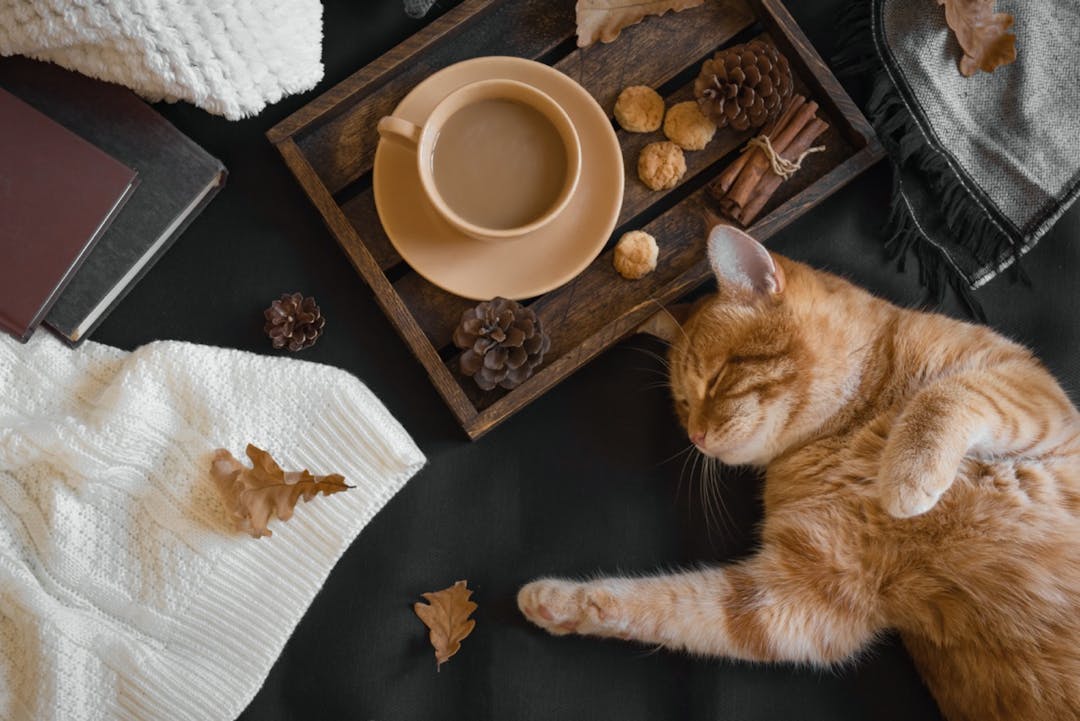As the crisp autumn air rolls in this fall, so does the unmistakable (and irresistible) aroma of pumpkin-spiced-everything! From lattes and candles to pastries and cereals, the smell of pumpkin spice permeates products everywhere. While these comforting flavors bring glee to humans, it’s important to remember that our furry family members have different dietary needs and tolerances than our own. Here, we delve into the world of pumpkin-spiced products, its implications for pets, and how to navigate the season safely with your best bud by your side.
Pumpkin spice vs. plain pumpkin
In the flurry of pumpkin spice products, it’s essential to understand that not everything that is labeled “pumpkin spice” contains actual pumpkin. In fact “pumpkin spice” usually refers to spices that go with pumpkin, rather than pumpkin itself. Many of these products are infused with various spices and artificial flavors which can cause issues for pets. While pumpkin alone can be beneficial for your four-legged friend, it’s crucial to opt for plain, natural pumpkin rather than pumpkin-spiced products.
What about pumpkin pie filling?
While a cat or dog would need to consume a significant amount of pie filling to experience toxicity from spices such as cinnamon and nutmeg, there are other aspects to consider. Pumpkin pie filling tends to have a good deal of added fat and sugar content which is unhealthy for pets. And these added ingredients could lead to other health issues. So if you want to share your pumpkin-spiced fall favorites with your pet, it’s best to stick with plain, unsweetened canned pumpkin to avoid unnecessary risks.
Pumpkin as a regular addition to your pet’s diet
Pumpkin can be a valuable addition to your pet’s diet when used correctly. Some of the benefits of natural pumpkin include:
- Pumpkin aids in digestion, alleviates diarrhea and constipation and promotes healthy gut flora.
- The high soluble fiber content in pumpkin adds bulk to your pet’s stool and encourages the production of beneficial fatty acids through fermentation occurring in the gut.
- Pumpkin is rich in prebiotics, which supports the growth of beneficial gut bacteria, particularly after a course of antibiotics.
- For pets struggling with weight issues, pumpkin can help by creating a feeling of fullness due to its high fiber content, leading to reduced overall food intake.
- Pumpkin may help with anal sac problems if your pet has had a history of chronically loose stool. But it’s not a cure-all for this issue, so be cautious and consult with a veterinarian for anal sac concerns.
If you’ve been curious about giving pumpkin to your pet, go ahead and give it a try! Just be sure to feed pumpkin in moderation – never give your pet more than 10% of their daily calories.
How much pumpkin can I give my pet?
Start by adding canned pumpkin to your pet’s food. It’s safe to give one to two teaspoons per ten pounds of body weight. So if your pet is twenty pounds, you can give two to four teaspoons of canned, unsweetened pumpkin. Be sure to start slowly at lower quantities and monitor your pet’s stool as pumpkin is known to affect digestion. Be sure that you don’t exceed 10% of your pet’s daily calories in pumpkin.
Signs your pet has had too much pumpkin
While pumpkin has some positive health benefits, there are times when it can be troublesome for pets. Pumpkins are naturally high in fiber. Recognizing that every cat and dog has a different tolerance for how much fiber their bodies can handle, some pets can manage pumpkin better than others. If your pet becomes gassy, or develops diarrhea or orange-colored stool, you should back off of the pumpkin and continue to monitor your pet for abnormal gastrointestinal systems. Once you stop giving pumpkin, your pet’s stool should quickly return to normal.
Dangers of pumpkin spice for cats and dogs
While the spices in pumpkin-spiced products aren’t healthy for any pet, tiny amounts shouldn’t cause harm. But today, loads of products are “pumpkin-spiced,” and not just the pie filling. The following are examples of how pumpkin-spiced products can harm your pet:
- Aromatherapy, fragrance “plug-ins” and potpourri – Small amounts of cinnamon essential oil and large quantities of powdered cinnamon can burn the skin and mouth, cause vomiting, diarrhea, low blood sugar, liver damage and changes in heart rate.
- Powdered nutmeg – Large amounts of powdered nutmeg can cause stomach upset, disorientation, high blood pressure and seizures.
- Powdered ginger – Large amounts of powdered ginger can cause stomach upset and lethargy.
- Pumpkin-spice lattes – In addition to the concerns surrounding the actual spices, the caffeine and milk in lattes can cause trouble for pets. Most pets are very sensitive to caffeine and are also lactose intolerant. The spices, caffeine and lactose, together can be extremely problematic for your pet and could make your pet sick.
- Cloves & allspice – In cats, cloves and allspice can cause liver toxicity.
Pumpkin-spiced products are tempting to share with pets but it’s important to understand the different risks associated with these festive products. With a little extra diligence, pet parents can ensure their pets stay safe and healthy during this cozy time of year. By opting for plain, canned pumpkin, reading labels carefully and avoiding products with added sugar, spices, caffeine and/or milk, you can ensure that this pumpkin-spiced season is a happy one for you and your pet.





